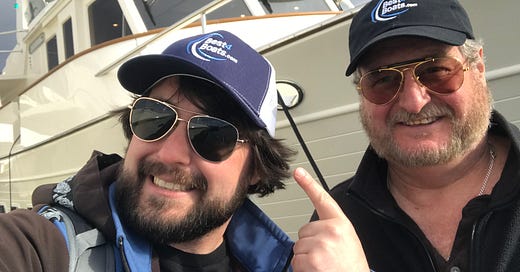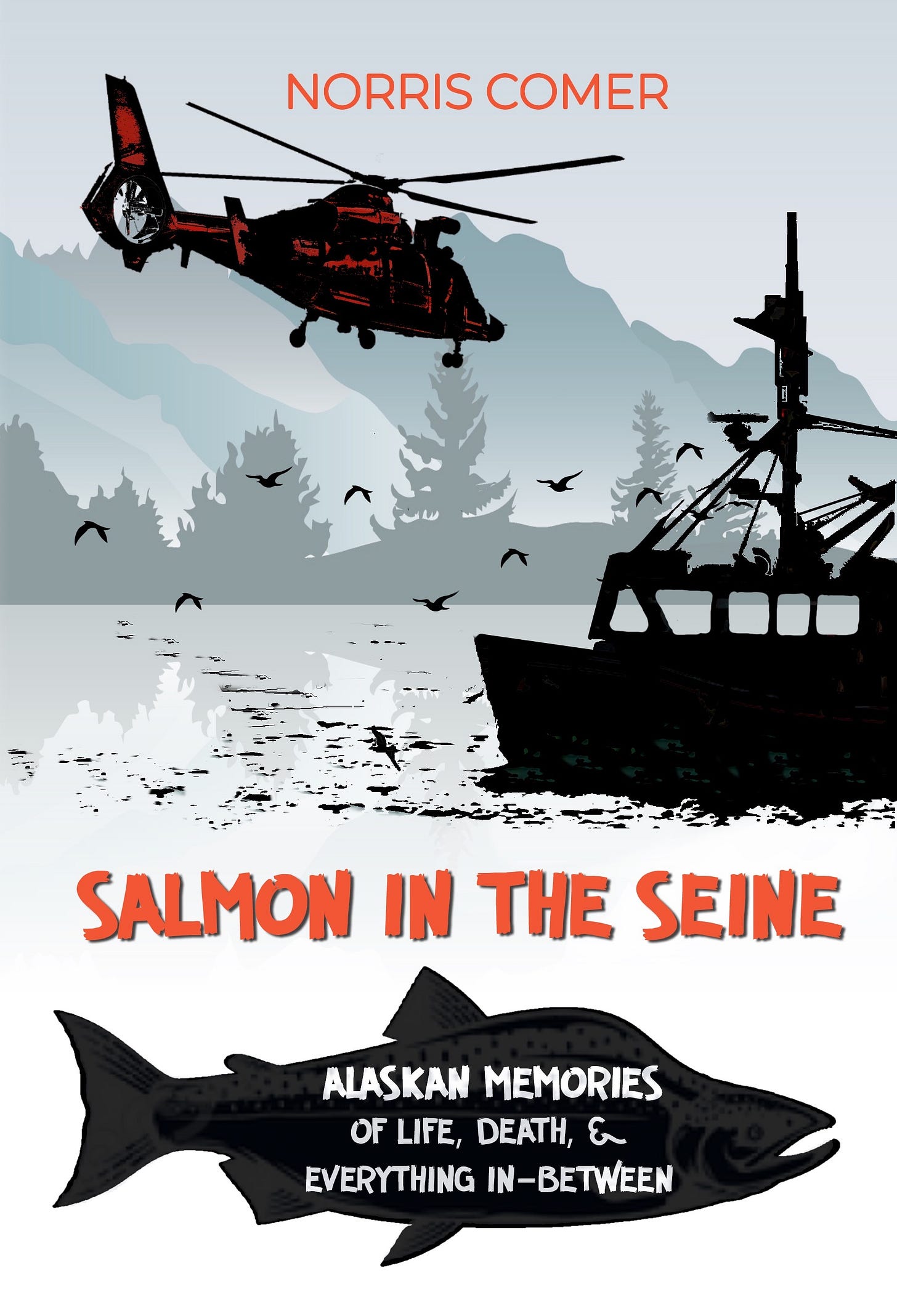Bar (Crossing) Crawl, Timberline Review Judging, and Three Manuscripts
Quiet on Substack means noise elsewhere
I’ve been neglecting my Substack! Although I’ll be honest, when I’m quiet on here it usually means I’m making noise elsewhere. There’s a lot going on behind the scenes and I have a few fun things to share in the spirit of keeping a strong pulse in this space.
Cascadian Bar (Crossing) Crawl - Best4Boats.com Taking Off
As many of you are aware, I’ve been roped into cofounding a new digital media outlet Best4Boats.com with a couple of great folks. Our “aquatic facing” news website and bi-monthly e-newsletter launched in February and is taking off nicely. We’re settling into our groove and my calendar is filling up with various on-water shenanigans for new stories. Perhaps my favorite element to all this is that we’re inviting all kinds of talented storytellers into the fold with our 4Friends network. For example, we’ve got a wild sailor man named Bob Bitchin who just contributed an article. C’mon, you don’t want to miss out on that do you?
We’re not just another boat media outlet, we’re a party! Somebody in the marine journalism space has to remain independent, no? Independent in both financial reality and in voice. Fishermen’s News, Pacific Maritime, Ocean Navigator, and Northwest Yachting are all dead or on pause as of this year. Giant media companies are hoarding the titles that remain like freakin’ Smaug on his treasure pile. Into the wild chaotic seas of 2020s American media feisty wee Best4Boats.com sets sail! AVAST!
The whole thing is very awesome and I get to write some of my best stories that just haven’t been a fit elsewhere for whatever reason. For example, I recently published part one of my Cascadia Bar Crawl series where I share my experiences crossing many of the notable river bar crossings of the Washington and Oregon coast—including the infamous “Graveyard of the Pacific” where 2,000 shipwrecks lie. I still don’t quite know how I ended up in all these sometimes harrowing situations, but I suppose a few decent tales and thankfully intact boats came of it. Cue intro tease:
The Pacific Coast of the Pacific Northwest, Cascadia to some, is stunningly beautiful and rugged for visitors, but for boaters this stretch of planet Earth is also hazardous. One of the defining features of the coastline of Washington and Oregon are that despite the several sheltered rivers and bays on the charts they are all accessed by bar entrance crossings. These bar crossings are so named because the river mouth flows over, and helps create, shallow sandbar systems that represent obstacles for mariners to navigate.
But the challenge is not simply a matter of navigating the ever-shifting sandbar mazes. The geomorphology of the shallows, power of the outgoing river currents, and ever turning tide pulls interact with incoming open ocean waves and highly variable winds to produce a variety of sea states that can be extreme. At times these forces align in our favor to create idyllic crossing conditions that are as pleasant as a cruise over a pond. More often these natural forces conspire in other ways to create towering walls of water, vicious boat sinking currents, and dangerous nightmarish conditions. US Coast Guard (USCG) observers are stationed at all these entrances to issue regular bar reports restricting or closing the crossings as necessary even to the largest ships. There is a reason that the USCG National Motor Lifeboat School trains their surfmen along the Columbia River bar. They also run their 47 Motor Lifeboats that can survive 360-degree capsizing in these conditions. If that doesn’t speak strongly enough to how hardcore these waters can be you can (safely please) storm watch from shore to see for yourself.
I recently realized that, probably due to naivete, I’ve crossed several of these Cascadian bar entrances over the course of the last decade or so without giving it too much thought until now. These often-spontaneous experiences varied across sectors from a commercial albacore tuna fishing gig to an Ocean Alexander delivery. So we begin my Cascadian Bar Crawl from the most northerly crossing to south starting with the Grays Harbor Bar…
You can read the whole Cascadia Bar Crawl part one, part two when it comes out, and sign up for our free Best4Boats e-newsletter right here. We’re new and hungry to delight our subscribers. If your curiosity is at all perked, a simple free click to subscribe is what keeps us alive. Seriously, your click is the currency of the age and more than appreciated.
The Timberline Review Judge - An Uplifting Experience
The Timberline Review is one of the, if not the, most lauded Oregon-based literary magazines. A publication of Willamette Writers, The Timberline Review is an all-volunteer literary journal with a focus on showcasing emerging talent. The magazine serves as essentially an annual writing competition with hundreds, maybe thousands?, of entries across multiple categories all vying for the limited 30 or so contributor publication spots. After a few months of us reader-judges doing our thing, the winners have been announced and the issue will be launched August 1st.
I was honored to be invited as a judge in the Nonfiction category which was overwhelmingly memoir and personal essays—about 60 first round entries to read for me. I was quite impressed with the methodology of Willamette Writers in that every entry got three different reader-judges. There were multiple rounds as well. This really is the only way to do an arts contest. Many a time I logged my score and notice the scores of the other judges were a two (pretty bad) versus a five (perfect) on the five-point scale. The subjective taste aspect of art is an intrinsic element to it all and the only way to account for personal biases in a fair competition format is multiple readers across multiple rounds.
This was my first time as a judge for a literary magazine like The Timberline Review having instead lived on the opposite side of the dynamic as the entrant competitor to be judged. I’ve been somewhat successful with a Writers Digest, Boat Writers International, and book award wins. There are several times that number of defeats kept private, trust me. But before my The Timberline Review reader experience, the judging process felt abstract. I was like a newbie gladiator as the door to the fighting pit swung open, euphoric victory or a snarling lion to the throat largely up to how the many chaotic variables outside of my control resolved themselves. All I could do is charge into it all with my sword and pray to the gods. Nothing felt particularly orderly or fair.
I learned that acting as a reader-judge in a real deal literary contest is a fantastic step for a maturing writer to take. Many of these systems we’ve created to elevate artistic work are, at the end of the day, groups of human beings adhering, or failing to adhere, to just rules. If like The Timberline Review you’ve got a robust and fair system of judging from a group of folks like Willamette Writers, who’ve been around in some form or another since 1965, then maybe give it a shot. Humankind hasn’t invented a better system than these democratic republic-inspired methods. If a competition or publishing route smells fishy to you, don’t go down that road. Our orientation huddle set a solid tone. No special treatments for entrants based on immutable characteristics. Strive for objectivity and consider the criteria even if your heart yearns for or is initially repulsed by a read.
Another point I want to note is less of a lesson learned and more of an uplifting takeaway; damn, there are a lot of great newbie writers out there! I was floored by many of the entrants and count them as superior to work I’ve seen published in mainstream books lately. Many of these free ranging one-off memoir competitors put what I see on the shelves at bookstores from big publishing houses to shame. What’s more I was struck by a sense of real pluralism being represented versus the “diverse voices but idealogical conformity” that’s attracted so many critics of the what feels like the dominate doctrine of the mainstream arts lately. There were Yugoslavian immigrant fisherfolk and “the other woman” of a marital affair and a farmer fixing up an old church organ and a medical student on the Navajo reservation and whale eating in northern Alaska. People from all walks of life were really laying down hot prose to express themselves exactly how they wanted to, not as anybody expected them to. There was little to no “is this what you want me to say, mommy-teacher-authority figure-social media?” energy—no, the gauntlets were down. I loved it.
Bottom line: hell yeah!
I’m very honored to be a part of this process and I look forward to the upcoming issue. A funny angle here is that I don’t know the names of the entrants (part of the methodology), so the announced contributors don’t mean anything to me yet. I’ll know who won when I crack open the new The Timberline Review in August like the rest of you.
Three Manuscripts - Orphans to Die in Darkness or Immortal Prose to Be?
Looming large as my most daunting ongoing struggle are three book manuscripts I’ve completed. Each manuscript is in a different stage of the process: full manuscript request from multiple Big 5 publishing houses after months of agent pitching, under initial review from my literary agent, and fresh off my desk in the hands of an editor pal. Different genres! 60,000 to 110,000 words! A five-book series pitch! Feeling absolutely nuts.
I’ve been in this state of multiple manuscripts lingering in the maybe pile of the broader literary world for about a year now. Probably gained and lost twenty pounds. Spent the odd week as a borderline alcoholic, the odd month dry as a bone. I’ve tried on positive and negative mindsets; exercising every day and none at all. Turned inward with classic literature and philosophy; outward with good friends and adventures. Celibacy. The complete opposite of celibacy. Ate well. Ate shit. Talked to strangers. Brooded hostilely. Smiled. Swore.
Nothing makes a damn difference.
There is only The Real and one’s ability to harmonize with The Real. Marcus Aurelius’ stoicism and Miyamoto Musashi’s The Way wins. You’re in the uncertainty and you just got to take it like a statue. Mindfully place that next step on the path. That’s it.
All or none of these manuscripts could become something. Elevated from the fever dream of a man alone in a room into part of our civilization’s transcendental artistic expression. I looked to the Los Angeles Festival of Books for examples of what’s “in”. What books got “it” in 2020s America? What is praise-, stage-, and photoshoot-worthy for our broader culture?
Ah, yes. How to Giggle. Wonderful.
If this is truly where our literary world is at, my manuscripts are totally fucked. Oh well, pass me the tequila. I’m working on two more manuscripts to take the edge off. I don’t need a book to instruct me how to giggle. Tehehe!
Consider buying my award-winning book, Salmon in the Seine: Alaskan Memories of Life, Death, & Everything In-Between. Available wherever books are sold. Leaving reviews on Amazon and Goodreads helps a ton too.









